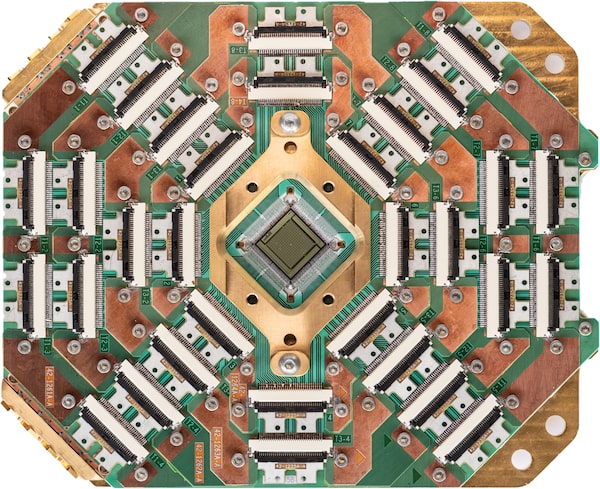
On Tuesday, D-Wave rolled out the latest edition of its hardware, a quantum computer chip that the company says it has re-engineered from the ground up.Courtesy of D-Wave Systems Inc.
D-Wave Systems Inc., the first company to offer a commercially available quantum computer, is making its strongest bid yet to show it can solve real-world business problems with the nascent technology.
On Tuesday, the Burnaby, B.C., company rolled out a re-engineered version of its quantum computer chip to go along with a retooled business model. Rather than selling its expensive, shed-sized computers, the company now almost exclusively offers online access to its unique capabilities.
The moves are in keeping with a shift in marketing style for D-Wave, which was founded in 1999. Part of its calling card remains the mystique of quantum computing, a field that scientists expect will one day produce computers that can vastly outpace conventional systems. But it is now stressing a more practical focus on customers’ immediate needs. The strategy includes promoting a hybrid model in which calculations are solved with a mix of standard and quantum computing.
“The company is now equally focused on [developing technology and delivering business value], which is a very significant change from where we were previously,” said Alan Baratz, a veteran Silicon Valley executive who joined D-Wave in 2017 to oversee software and applications and became CEO in January.
Baratz also acknowledged D-Wave is seeking to move on from criticisms that arose after its brash entry into the quantum computing arena. Its version of the technology is different and more specialized than the general form, known as “gate model” quantum computing, which has been pursued by researchers and tech companies for years.
Both approaches replace bits — the ones and zeros of conventional computing — with “qubits” that can simultaneously hold a mix of values and interact with each other in complex ways. But where gate model quantum computers must keep their the qubits in a difficult-to-manage quantum state, D-wave’s approach, known as “quantum annealing,” works by letting them fall out of that quantum state. The approach is best suited to solving “optimization” problems, where the computer identifies the best choice among many possibilities.
D-Wave has gradually won over skeptics on the question of whether its device does what it claims. But a more relevant matter for customers is to what extent it can outperform standard computers.
“A fundamental problem is whether or not quantum effects help to accelerate the computation,” said Hidetoshi Nishimori, a physicist at the Tokyo Institute of Technology and a pioneer in the study of quantum annealing. Dr. Hidetoshi added that, in some respects, D-Wave’s technology remains ahead of the science as well as competitors exploring the possibilities of quantum annealing.
The company is still far from self-sustaining; it has raised more than US$300-million in venture capital while booking more than US$75-million in customer contracts to date. But its efforts to position itself as a provider of ready-to-go technology that can deliver commercial benefits comes as investment and activity in quantum computing is accelerating globally.
Much of the focus by others, including Google, has been on achieving so-called “quantum-supremacy,” whereby a quantum computer completes a calculation that would take a standard supercomputer days, years or even centuries to complete.
Mr. Baratz said that while the pursuit of quantum supremacy was a worthy long-term goal, “there isn’t anything in what Google has done or what we have heard that others pursuing quantum advantage will likely deliver that will be of any value to customers."
D-Wave’s customers include Canadian grocery chain Save-On-Food, which is pilot-testing the company’s algorithms, along with Menten AI, a San Francisco biotech firm using the system to identify proteins that could help combat COVID-19 and Volkswagen, an early adopter of D-Wave’s technology that will employ the system to optimize how cars are painted on assembly lines.
Florian Neukart, director of advanced technologies at Volkswagen Group of America, said D-Wave’s technology may not qualify as quantum supremacy but it can still deliver an advantage. "I don’t know what you’d want to call it, maybe business supremacy. … That’s why the D-Wave system is interesting for us,” he said.
In developing its new chip, D-Wave says it is dispensing with another criticism: that its technology cannot be easily scaled up. The new chip has more than double the number of qubits relative to its predecessor and they are more interconnected in a way that allows the system to tackle a richer set of problems, the company says.
Researchers working with the previous version of the chip have already shown that it can be used to mimic quantum effects that arise in specialty materials, offering another potential application.
“The idea that I can use a computer as a proxy for a material is a really powerful one,” said Travis Humble, a quantum computer scientist at the Oak Ridge National Laboratory in Tennessee, who has worked with D-Wave computers. He added that the form of quantum computing D-Wave has pioneered is likely to remain relevant even as gate model quantum computers continue to develop.
Your time is valuable. Have the Top Business Headlines newsletter conveniently delivered to your inbox in the morning or evening. Sign up today.
 Sean Silcoff
Sean Silcoff Ivan Semeniuk
Ivan Semeniuk